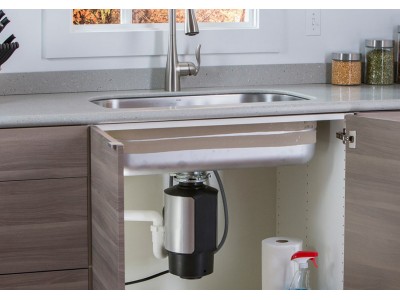Garbage and especially food waste complicate a person’s life, making his life hazardous to the environment. Every year, the world generates about 2 billion tons of household waste, and this figure is constantly growing. We have found an effective way to deal with food waste - a food waste shredder or disposer, which you can buy in our online store, does an excellent job of dealing with it.
Today we are looking into whether the disposer is so omnivorous and what waste we need to be more careful with. So, what absolutely should not be thrown into a food waste disposer, how to extend the life of the device and maintain the sewage system in working order.
Coffee grounds
Coffee grounds that are pasty and finely ground are unlikely to be a problem for the grinder itself, but with the sewer system everything is not so simple. If grounds regularly enter the system, it can cause a blockage.

Pasta, rice, bread
Foods that actively absorb moisture and increase in size, which can lead to clogging of the sewer system. Therefore, if you are processing such products in a food waste disposer, let it run for at least 30-40 seconds and rinse off the shredded food with cold water. These recommendations also apply to other grain products that absorb water well, such as rolled oats.

Bones
Bones are one of the strongest natural materials, so not all of them can be crushed in a disposer. The waste shredder can easily handle fish and small chicken bones, but larger specimens can shorten the life of the device. To ensure that your disposer serves you faithfully for a long time, be selective when shredding this type of waste.

Nut shells, seafood shells
Another potentially dangerous type of food waste that can harm your food processor. The situation is the same as with animal bones. Also be careful when crushing large batches of peanuts, which turn into a paste and can clog the drain if there is not enough water.

Fruits and berries with large seeds
If it is not possible to remove the seeds, then in some cases, to avoid trouble, it is better to throw such fruits and berries in the trash. We are talking about those that have large, regular-shaped seeds that are difficult to crush.

Onion peel
Husk is the outer shell of onions that can bypass the chopper blades, settle on parts of the device, and sometimes get stuck in the sewer system, creating blockages.

Fibrous fruits and vegetables
You've probably encountered a similar situation when you processed vegetables and fruits in a meat grinder - their fibers can interfere with the normal operation of the device. A few root vegetables or fruits will not harm the chopper in any way, but with large volumes you need to be more careful.

Potato peeling
This applies not only to potatoes, but also to other vegetables containing large amounts of starch. After thorough grinding with a disposer, they turn into a paste-like mass that can settle in the sewer system and create serious blockages.

Fat, oil
Be careful with foods that thicken when cooled, clogging the inside of the chopper and the drainage system. It is better to let them cool and then throw them in the trash.

Non-food waste
Polyethylene bags and synthetic wipes can clog your sewer system, but most importantly, they are not made from biodegradable materials. One of the reasons why we use a food waste disposer in our kitchen is to care for the environment. So let's be true to this concept to the end.

Сonclusions
The food waste shredder can handle large volumes and almost any kind of food waste. Most devices of this type provide overload protection and auto-reverse, which is activated when clamped, as, for example, in Leomikao brand disposers. In combination with simple operating rules, this guarantees a long service life of the chopper and its trouble-free operation.




